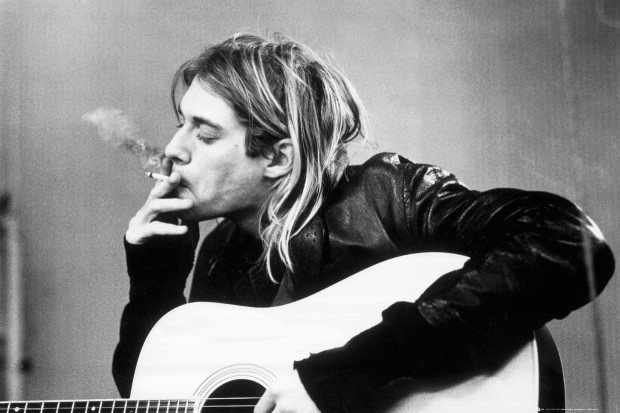

“Teenage angst has paid off well, now I’m bored and old.”
Serve The Servants – In Utero 1993
“Please don’t join that stupid club of musicians who die young.”
Wendy O’Connor (Cobain’s mother) – Rather prophetically, but sadly ineffectually, early 1994.
“I’m confused. I don’t know what alternative is.”
You Am I’s Tim Rogers accepting this year’s ARIA Award for Best Alternative Band.
It’s rare that you experience such a feeling of loss over the death of someone you’ve never met.
The death of Nirvana’s lead singer and gifted muse, Kurt Cobain, is the modern equivalent of Hendrix or Morrison, or whoever has departed way before their time and left the rest of us shaking our heads in bewilderment. Melodramatic words for sure, but there’s nothing quite so sad as someone being cut off in their prime, especially when they do it themselves.
In a word of sadly corporate-dominated musical tastes, Nirvana married the seemingly incompatible hands of commerciality and credibility and changed the way the conservative masses looked at music.
Nirvana, in a world of sadly disposable entertainment, somehow merged ‘alternative’ into the public’s collective consciousness with 1991’s major label debut, Nevermind, and changed perceptions of alternative and mainstream for a long time.
All this from a band who started out in a town like any other, Seattle, Washington, with no particular aspirations of greatness.
A friend of mine, a Seattle resident in the late 1980’s, saw Nirvana way before the days when the world wanted them. I never saw them. Another friend of mine has sworn that he’d grow his already shoulder length hair until they toured Australia again. Perhaps a crew cut is in order.
Nirvana’s first album Bleach (1989) on the infamous Sub Pop label only caught the attention of the serious few at its release, but the indisputable talent of one Kurt Cobain shone through like nothing before.
Cobain, a free spirit brought up in what was to him the redneck environment of Aberdeen, Washington, probably carried more demons than we’ll ever have to deal with. Arrested in his late teens for spray-painting the slogan ‘Homosexual sex rules’ against a wall, his apparent heterosexuality was an irrelevance when compared to the greater good that came out of confronting the homophobia that wallpapered his young life.
So what’d he do? Well, Kurt Cobain as songwriter for Nirvana did what few artists could ever hope to do. He captured the moment perfectly. As The Beatles captured 1967 with Sgt. Pepper’s Lonely Hearts Club Band, and the Rolling Stones did 1972 with Exile On Main Street, Nirvana combined canny songwriting, popular need for a worthwhile contemporary musical voice and a break from mainstream monotony and achieved what was seemingly impossible on 1991’s Nevermind.
It snuck up on everybody. Consider that on the band’s 1991-92 tour of Australia, Nirvana were booked to play Metropolis Fremantle the week they hit the number one spot on the US charts. Just when every lucky ticket holder felt exactly that, the show was cancelled. Kurt was either exhausted, strung out or… something. We just didn’t get to see them.
Meanwhile Nirvana’s success opened up the doors for literally a million bands around the world and saw their hometown looked upon as something of a grunge mecca. Their effect was so profound you could taste it.
So how do you follow up a historic left-of-field release that knocks Michael Jackson from the No. 1 spot? You can’t really, but after the B-side and rarity release Incesticide Cobain saw Nirvana through In Utero, an album that had the right mix of popular appeal and murderous attack to maintain a sizable reputation. In the lead-up to In Utero Cobain married Hole singer Courtney Love and the couple gave birth to daughter Frances Bean, but domestic bliss (?) made no difference to his outlook. In Utero was an angry, less accessible record than its predecessor, but was the perfect follow-up. It kept the band’s credibility in tact, yet sold more than respectfully. That was an achievement in itself.
Yet through a fascinated media we heard more and more melodrama from the Cobain camp. The difference was that Kurt Cobain wore his depression close to his chest, rather than the constant whingeing hype we have to endure from Cobain’s polar icon, Axl Rose. Here was a man cut in half by self-made misery, drug addiction and fame. It dogged his life through failure and success, and rendered him poorly equipped to deal with either. When Cobain nearly overdosed on heroin and alcohol in Rome a month ago, it seemed yet another predictable episode in a well documented chain of events.
Last Saturday, we lost him for good, and if you weren’t moved then you just hadn’t been listening. Kurt Cobain went missing for a week, yet was found in his own garage with a fatal bullet wound to the head.
What do you say? He left his own problems behind, but also a wife and an 18 month-old daughter. Never a role model, the last thing we need is someone saying he set a bad example – he did, but this is a mature day and age. People make their own choices. Don’t look at ‘rock stars’ to make yours for you.
So, for the first time, in a long time, we’ve lost an icon all too early. At the age of 27, Kurt Cobain has ensured his legendary status by dying too young. He could have done so much more – but career-wise this is the most through-the-roof thing that could happen.
Millions of people would have died to occupy a similar space in life to Kurt Cobain.
He died in spite of it.
R.I.P. at last Kurt. Thanks for a bumpy ride.
BOB GORDON
